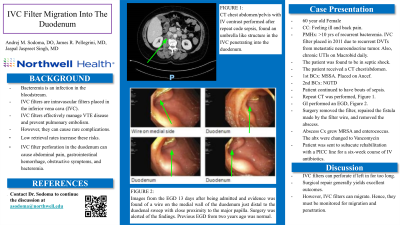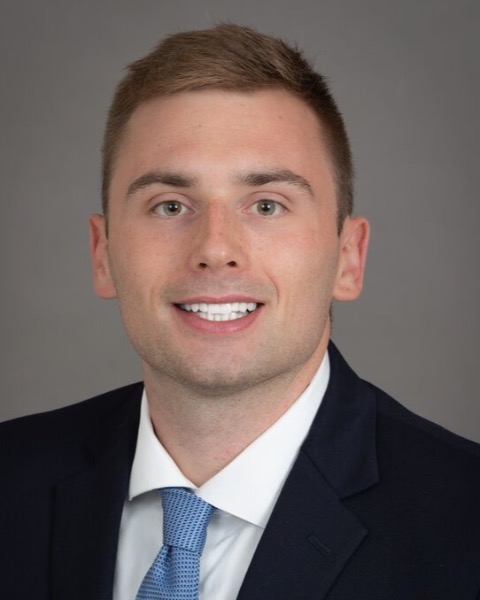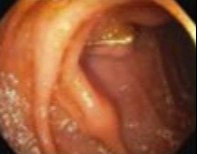Sunday Poster Session
Category: General Endoscopy
P0691 - IVC Filter Migration Into Duodenum
Sunday, October 27, 2024
3:30 PM - 7:00 PM ET
Location: Exhibit Hall E

Has Audio

Andrej M. Sodoma, DO
South Shore University Hospital
Selden, NY
Presenting Author(s)
Andrej Sodoma, DO1, James R. Pellegrini, MD2, Sunjit S. Jaspal, MD3, Jaspreet Singh, MD4
1South Shore University Hospital, Bay Shore, NY; 2Nassau University Medical Center, Great River, NY; 3Northwell Health, Dix Hills, NY; 4Northwell Health, Bayshore, NY
Introduction: Inferior vena cava filters effectively manage VTE disease and prevent pulmonary embolism. However, they can cause rare complications. Low retrieval rates increase these risks. IVC filter perforation in the duodenum can cause abdominal pain, gastrointestinal hemorrhage, or obstructive symptoms.
Case Description/Methods: This case study delves into a case of recurrent bacteremia for nearly a decade in a 60-year-old female with prior IVC filter placement in 2011. Notably, she has a history of chronic UTIs on Macrobid daily. She initially felt ill and went to urgent care, but nothing was found. The patient continued to feel ill after going to urgent care and started to have some back pain, so she went to the ER. The patient was found to be in septic shock and started on fluids and broad-spectrum antibiotics. The patient received a CT chest/abdomen. CT scan of the abdomen showed mild right retroperitoneal edema around her IVC filter. Blood culture grew MSSA bacteremia. The patient had another bout of sepsis, and repeat blood cultures showed no growth. Repeat CT showed the IVC filter invading the GI tract. GI was consulted, and they performed an EGD and found the IVC filter wire in the duodenum. Surgery was consulted; they removed the filter, repaired the fistula made by the filter wire, and removed the abscess. Following the operation, she was transferred to critical care due to significant blood loss and the administration of vasopressors during the procedure. On postoperative day 5, the patient was stable enough to be transferred to the floors and could finally eat, void urine, and have regular bowel movements. She was on IV antibiotics throughout her hospital stay, and she was finally sent to subacute rehabilitation with a PICC line for a six-week course of IV antibiotics.
Discussion: IVC filters are generally safe, but complications can occur if they perforate through the vena cava, causing damage to surrounding structures. Physicians should be cautious for IVC perforation through the duodenum if patients experience abdominal pain, back pain, or persistent bacteremia. Surgical repair generally yields excellent outcomes, emphasizing the importance of monitoring IVC filter migration and penetration.

Disclosures:
Andrej Sodoma, DO1, James R. Pellegrini, MD2, Sunjit S. Jaspal, MD3, Jaspreet Singh, MD4. P0691 - IVC Filter Migration Into Duodenum, ACG 2024 Annual Scientific Meeting Abstracts. Philadelphia, PA: American College of Gastroenterology.
1South Shore University Hospital, Bay Shore, NY; 2Nassau University Medical Center, Great River, NY; 3Northwell Health, Dix Hills, NY; 4Northwell Health, Bayshore, NY
Introduction: Inferior vena cava filters effectively manage VTE disease and prevent pulmonary embolism. However, they can cause rare complications. Low retrieval rates increase these risks. IVC filter perforation in the duodenum can cause abdominal pain, gastrointestinal hemorrhage, or obstructive symptoms.
Case Description/Methods: This case study delves into a case of recurrent bacteremia for nearly a decade in a 60-year-old female with prior IVC filter placement in 2011. Notably, she has a history of chronic UTIs on Macrobid daily. She initially felt ill and went to urgent care, but nothing was found. The patient continued to feel ill after going to urgent care and started to have some back pain, so she went to the ER. The patient was found to be in septic shock and started on fluids and broad-spectrum antibiotics. The patient received a CT chest/abdomen. CT scan of the abdomen showed mild right retroperitoneal edema around her IVC filter. Blood culture grew MSSA bacteremia. The patient had another bout of sepsis, and repeat blood cultures showed no growth. Repeat CT showed the IVC filter invading the GI tract. GI was consulted, and they performed an EGD and found the IVC filter wire in the duodenum. Surgery was consulted; they removed the filter, repaired the fistula made by the filter wire, and removed the abscess. Following the operation, she was transferred to critical care due to significant blood loss and the administration of vasopressors during the procedure. On postoperative day 5, the patient was stable enough to be transferred to the floors and could finally eat, void urine, and have regular bowel movements. She was on IV antibiotics throughout her hospital stay, and she was finally sent to subacute rehabilitation with a PICC line for a six-week course of IV antibiotics.
Discussion: IVC filters are generally safe, but complications can occur if they perforate through the vena cava, causing damage to surrounding structures. Physicians should be cautious for IVC perforation through the duodenum if patients experience abdominal pain, back pain, or persistent bacteremia. Surgical repair generally yields excellent outcomes, emphasizing the importance of monitoring IVC filter migration and penetration.

Figure: The IVC filter wire on the medial side of the duodenum is a picture from the EGD.
Disclosures:
Andrej Sodoma indicated no relevant financial relationships.
James Pellegrini indicated no relevant financial relationships.
Sunjit Jaspal indicated no relevant financial relationships.
Jaspreet Singh indicated no relevant financial relationships.
Andrej Sodoma, DO1, James R. Pellegrini, MD2, Sunjit S. Jaspal, MD3, Jaspreet Singh, MD4. P0691 - IVC Filter Migration Into Duodenum, ACG 2024 Annual Scientific Meeting Abstracts. Philadelphia, PA: American College of Gastroenterology.
